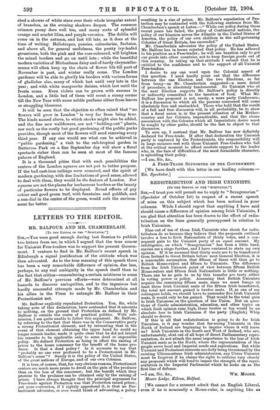MR. BALFOUR AND MR. CHAMBERLAIN.
SIE,—You were good enough during last Session to publish two letters from me, in which I argued that the true course for Unionist Free-traders was to support the present Govern- ment. I venture to find in Mr. Balfour's recent speech in Edinburgh a signal justification of the attitude which was then advocated. As to the true meaning of this speech there has been a very remarkable difference of opinion, due less, perhaps, to any real ambiguity in the speech itself than to the fact that critics—remembering a certain mistiness in some of Mr. Balfour's previous efforts—were determined at all hazards to discover ambiguities, and to the ingenious but hardly successful attempts made by Mr. Chamberlain and his allies in the Press to entangle Mr. Balfour in their
Protectionist net.
Mr. Balfour explicitly repudiated Protection. You, Sir, while taking note of this declaration, have contended that it amounts to nothing, on the ground that Protection as defined by Mr. Balfour is outside the realm of practical politics. With sub- mission, I am quite unable to follow this argument. Mr. Balfour, by referring to the fact that there was in the Conservative party a strong Protectionist element, and by intimating that in the event of that element obtaining the upper hand he could no longer remain leader, made it quite clear that he did not intend his remarks to be applicable only to some dead or impossible policy. He defined Protection as being in effect the raising of prices to the home consumer for the benefit of the home pro- ducer. Is that a dead policy ? Is it accurate to say that " probably no one ever professed to be a Protectionist in Mr. Balfour's sense"? Surely it is the policy of the United States, of the great nations of Europe, and of our own Colonies.
It is true, of course, that, for very obvious reasons, Protectionist orators are much more prone to dwell on the gain of the producer than on the loss of the consumer; but the benefit which they promise to the producer can be obtained only by the raising of prices. I have always thought that the principal argument for Free-trade against Protection was that Protection raised prices ; yet your contention, if I rightly apprehend it, is that no Pro- tectionist advocates, or ever would think of advocating, a policy
resulting in a rise of prices. Mr. Balfour's repudiation of Pro- tection may be contrasted with the following sentence from Mr. Chamberlain's speech at Luton :—" While our policy during these recent years has failed, the policy of Continental nations, the policy of our kinsmen across the Atlantic in the United States of America, the policy of our own children in the self-governing Colonies of Great Britain, has succeeded." Mr. Chamberlain advocates the policy of the United States. Mr. Balfour has in terms rejected that policy. He has adhered to his position as a Free-trader; he will use taxation only to get our goods into other countries, not to keep foreign goods out of this country. In taking up that attitude I submit that he is entitled to the confidence and to the support of all Unionist Free-traders.
I desire to say one word upon the Colonial aspect of this question. I need hardly point out that the difference between the one Election and the two Elections, so far from being—as Mr. Chamberlain suggested—a mere detail of procedure, is absolutely fundamental. No Unionist who at the next Election supports Mr. Balfour's policy is directly or indirectly committed to the taxation of food. What Mr. Balfour has proposed is not, surely, a mere party Conference ; it is a discussion to which all the persons concerned will come absolutely free and unshackled. Those who hold that the result of a full and free discussion will, in all probability, be to show that a fiscal union is, in the present situation of the Mother- country and her Colonies, impracticable, and that the closer association with the Colonies which all Imperialists desire must be sought by other paths, should be the last to object to that discussion.
To sum up, I contend that Mr. Balfour has now definitely declared for Free-trade. If after that declaration the Unionist party is captured by the Protectionists, the responsibility will in large measure rest with those Unionist Free-traders who fail at the critical moment to afford resolute support to the leader who, in the face of difficulties of the most formidable character, is upholding their policy.
—I am, Sir, &c.,
A FREE-TRADE SUPPORTER OF THE GOVERNMENT.
REDISTRIBUTION AND IRISH UNIONISTS.










































 Previous page
Previous page